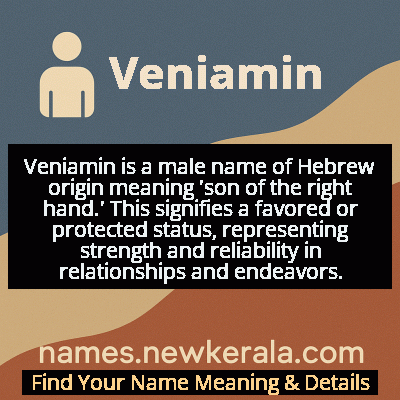Veniamin Name Meaning & Details
Origin, Popularity, Numerology Analysis & Name Meaning of Veniamin
Discover the origin, meaning, and cultural significance of the name VENIAMIN. Delve into its historical roots and explore the lasting impact it has had on communities and traditions.
Name
Veniamin
Gender
Male
Origin
Hebrew
Lucky Number
6
Meaning of the Name - Veniamin
Veniamin is a male name of Hebrew origin meaning 'son of the right hand.' This signifies a favored or protected status, representing strength and reliability in relationships and endeavors.
Veniamin - Complete Numerology Analysis
Your Numerology Number
Based on Pythagorean Numerology System
Ruling Planet
Venus
Positive Nature
Harmonious, responsible, caring, and artistic.
Negative Traits
Overly idealistic, superficial, possessive, or jealous.
Lucky Colours
Pink, turquoise.
Lucky Days
Friday.
Lucky Stones
Diamond, turquoise.
Harmony Numbers
2, 3, 9.
Best Suited Professions
Artists, musicians, teachers, healthcare workers.
What People Like About You
Warmth, nurturing nature, artistic flair.
Famous People Named Veniamin
Veniamin Kaverin
Writer
Soviet novelist known for 'Two Captains' and his contributions to Soviet literature
Veniamin Fleyshman
Composer
Soviet composer and student of Dmitri Shostakovich, known for his opera 'Rothschild's Violin'
Veniamin Soldatenko
Athlete
Soviet race walker who won Olympic silver and bronze medals in the 1970s
Veniamin Margulis
Violinist
Russian violinist and professor at Moscow Conservatory, renowned for his teaching and performances
Name Variations & International Equivalents
Click on blue names to explore their detailed meanings. Gray names with will be available soon.
Cultural & Historical Significance
In Russian and Eastern European contexts, Veniamin became established through the spread of Christianity and the adoption of biblical names into the Orthodox tradition. The name gained particular prominence among both Jewish communities and Christian families seeking names with religious heritage. During the Soviet era, while religious names faced some decline, Veniamin maintained usage among intellectual and artistic circles. The name appears in Russian literature and historical records, often associated with educated, cultured individuals. Today, it represents a bridge between ancient biblical tradition and modern Russian cultural identity, embodying both religious heritage and intellectual sophistication.
Extended Personality Analysis
People named Veniamin are typically characterized by their intellectual depth, reliability, and strong moral compass. They tend to be thoughtful individuals who approach life with careful consideration and analytical thinking. The name's meaning as 'son of the right hand' often manifests in their personality as a natural inclination toward supportive roles—they are the dependable friends, the trusted colleagues, and the reliable family members who provide stability in relationships. Veniamins are often perceived as wise beyond their years, possessing an innate understanding of complex situations and the patience to work through challenges methodically.
Their personality combines traditional values with intellectual curiosity, making them both grounded and innovative. While they may appear reserved initially, they form deep, meaningful connections with those they trust. Veniamins typically excel in fields requiring both analytical thinking and interpersonal skills, such as education, law, medicine, or the arts. They are often drawn to intellectual pursuits and value knowledge and tradition. Their combination of loyalty, intelligence, and quiet strength makes them natural leaders who lead through example rather than force, earning respect through their consistency and integrity. Despite their serious nature, they often possess a dry wit and deep appreciation for beauty and culture.
Modern Usage & Popularity
In contemporary usage, Veniamin remains primarily concentrated in Russian-speaking populations, particularly in Russia, Ukraine, Belarus, and among Russian diaspora communities worldwide. While not ranking among the top 50 most popular names in modern Russia, it maintains a consistent presence, often chosen by parents seeking a traditional name with biblical roots and intellectual connotations. The name experienced some decline during the Soviet period when religious names were less favored but has seen a modest revival in post-Soviet Russia as part of a broader return to historical and religious naming traditions. Outside Russian-speaking regions, the name is uncommon, with most cultures preferring local variants like Benjamin, Benjamín, or Beniamino. In Israel, Russian immigrants sometimes use Veniamin, though the Hebrew Binyamin is more common. The name's usage reflects a balance between maintaining cultural heritage and adapting to modern naming trends, often appealing to educated, urban families who value both tradition and sophistication.
Symbolic & Spiritual Meanings
Symbolically, Veniamin carries rich layers of meaning derived from its Hebrew roots and cultural adaptations. The core symbolism of 'son of the right hand' represents strength, favor, and authority across multiple traditions. In biblical and ancient Near Eastern contexts, the right hand symbolized power, blessing, and covenant relationships—making the name emblematic of divine favor and trusted companionship. This extends to metaphorical meanings of support and reliability, as the 'right-hand person' is one who provides essential assistance and enables success. The name also symbolizes youth and promise, reflecting Benjamin's status as Jacob's youngest son who represented future potential and continuity.
In Russian cultural context, Veniamin additionally symbolizes intellectual tradition and cultural sophistication, often associated with educated, artistic individuals. The name carries connotations of depth, wisdom, and cultural heritage, connecting the bearer to both ancient biblical narratives and Russian intellectual history. Symbolically, it represents the bridge between faith and reason, tradition and modernity, making it a name that embodies both spiritual depth and intellectual pursuit. The combination of these symbolic layers creates a name that suggests someone who is both grounded in tradition and capable of intellectual and spiritual leadership.

